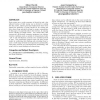131 search results - page 16 / 27 » If you have time, save energy with pull |
COMCOM
2004
13 years 7 months ago
2004
Storage, memory, processor, and communications bandwidth are all relatively plentiful and inexpensive. However, a growing expense in the operation of computer networks is electric...
OSDI
2002
ACM
14 years 7 months ago
2002
ACM
In this paper we demonstrate the benefits of application involvement in operating system power management. We present Coop-I/O, an approach to reduce the power consumption of devi...
ISLPED
2000
ACM
13 years 12 months ago
2000
ACM
Recovering and reusing circuit energies that would otherwise be dissipated as heat can reduce the power dissipated by a VLSI chip. To accomplish this requires a power source that ...
CODES
2009
IEEE
14 years 2 months ago
2009
IEEE
Time redundancy (rollback-recovery) and hardware redundancy are commonly used in real-time systems to achieve fault tolerance. From an energy consumption point of view, time redun...
SIGCOMM
2010
ACM
13 years 7 months ago
2010
ACM
Data centers are a major consumer of electricity and a significant fraction of their energy use is devoted to cooling the data center. Recent prototype deployments have investigat...

